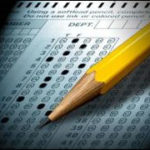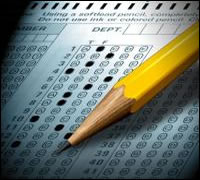
Education Secretary Arne Duncan on Sept. 2 announced the recipients of millions of dollars in federal grants to provide new state assessment systems to test students’ 21st-century skills. The announcement comes as part of the recent push from the federal Education Department (ED) for higher-performing schools and common standards.
Two large state coalitions won this “Race to the Top” competition to create a series of new national academic tests to replace the current patchwork system: the SMARTER Balanced Assessment Consortium (SBAC) from Washington state and the Partnership for the Assessment of Readiness for College and Careers (PARCC) from Florida. (See “States collaborate on new national exams.”)
SBAC, which submitted an application on behalf of a group of 31 states, received $160 million. It will focus on formative assessments and the use of technology for testing to measure student growth over time through computer adaptive testing. It will continue to use one test at the end of the year for accountability purposes but will create a series of interim tests to inform students, parents, and teachers about whether students are on track.
PARCC, which submitted an application on behalf of a group of 26 states, received $170 million. It will focus on testing students’ critical thinking skills by examining their speaking skills, reading analysis and essay skills, digital media skills, and project-building skills. It also will replace the one end-of-year, high-stakes accountability test with a series of assessments throughout the year that will be averaged into one score for accountability purposes, reducing the weight given to a single test administered on a single day—and providing valuable information to students and teachers throughout the year.
“By joining forces, our states will be able to learn from one another and develop next-generation assessments that monitor student achievement of the knowledge and skills necessary for success after high school,” said Massachusetts Education Commissioner Mitchell D. Chester, who will chair the PARCC governing board.
Both groups will assess students’ knowledge of mathematics and English/language arts from third grade through high school and could replace existing tests, such as interim assessments that are commonly used in classrooms today.
Both consortia designed their assessment systems with expert input and help from teachers of English language learners (ELL) and students with disabilities to ensure that these students are appropriately assessed, officials said.
Higher-education institutions within the consortia’s states also have “bought in” to the new assessments, said Duncan—many by accepting these assessment scores and forgoing remediation if student scores are high.
The proposals submitted by the two consortia had many similarities, but they are not identical in approach or philosophy—characteristics Duncan said are needed for progressive thinking and effective change in the U.S.
“This is the beginning of assessments 2.0,” said Duncan during a live webcast from Achieve’s Annual American Diploma Project Network Leadership Team Meeting at the Westin Hotel in Alexandria, Va. “And what makes this creation even more admirable is that it’s 100-percent the vision of state and local leaders.”
Achieve is a nonprofit education reform organization that helps states raise academic standards and graduation requirements, improve assessments, and strengthen accountability.
Duncan made clear that these new assessments are not pilot programs, but will be implemented in participating states by the 2014-15 school year.
“This is the first time we’ll ever really know if students are college and career ready. Also, parents, students, and the community will finally have an assessment system that lets them be proactive in their learning by giving them up-to-the-minute results and testing critical skills,” he said.
“Our nation is in active competition for jobs with students from around the world,” said Florida Education Commissioner Eric J. Smith. “This federal award … signals high-quality instruction in every classroom and [gives] our families the ability to accurately track the progress of their students.”
“This funding will allow partnership states to make an ‘apples to apples’ comparison of student achievement,” said Louisiana State Superintendent of Education Paul Pastorek.
“The immediate assessment results will provide teachers the information they need to adapt their instruction to the needs of each student,” said Judy Park of Utah, co-chair of the newly elected SBAC executive committee. “Those results will also improve student motivation during the testing process and help students better understand their current knowledge and skills.”
Duncan also explained that these assessments will ease the burden of testing and teaching to the test.
“As I travel around the country, the No. 1 complaint I hear from teachers is that state bubble tests pressure teachers to teach to a test that doesn’t measure what really matters,” he said. “These new assessments will allow for a more rigorous and relevant curriculum.”
Though changing the design of state assessments is a large step in the right direction, Duncan also pointed out that assessments are only as good as the standards being tested.
Duncan recommended that states should seriously consider adopting the Common Core State Standards. Already, 35 states and Washington, D.C. have adopted these standards, and ED estimates that within the year 40 states will support the standards.
“These new assessments are not going to create an educational nirvana,” said Duncan, “but by creating these assessments and adopting common core standards, it lays the foundation for better curricula and teaching.”
Duncan closed by mentioning that the reauthorization of the Elementary and Secondary Education Act, now known as No Child Left Behind, is a good opportunity to revamp assessments for other subjects, such as science and history.
Links:
SBAC
Note to readers:
Don’t forget to visit the Measuring 21st-century skills resource center. Graduates who enter the workplace with a solid grasp of 21st-century skills bring value to both the workplace and global marketplace. Go to:
Measuring 21st-century skills
- #4: 25 education trends for 2018 - December 26, 2018
- Video of the Week: Dealing with digital distraction in the classroom - February 23, 2018
- Secrets from the library lines: 5 ways schools can boost digital engagement - January 2, 2018


Comments are closed.